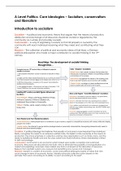A Level Politics: Core ideologies – Socialism, conservatism
and liberalism
Introduction to socialism
Socialism – A political and economic theory that argues that the means of production,
distribution and exchange of all resources should be owned or regulated by the
community as a whole (not privately owned).
Communism – A way of organising a society so that all property is owned by the
community with each individual receiving what they need and contributing what they
can.
Marxism – The collection of political and economic ideas of Karl Marx, a German
political philosopher who made a major contribution to socialist thinking in the 19th
century.
Socialism: A political ideology that believes that equality of outcome is more important than individual
liberty, recognises the need for an extensive welfare state, the belief in state ownership of the means of
production, the strong emphasis on collective working class organisations such as trade unions, and the
desire to redistribute wealth and end the class system and those institutions where membership is linked
to birth and privilege.
communism: Communism is an economic system based upon public ownership and a planned
economy. Resources are allocated by the state. Aims to eliminate the possibility of monopolisation of a
market and exploiting consumers. Free markets only form a small part of the allocation of resources.
Believes that capitalist systems are unequal and benefitting only owners and managers.
Marxism: Marxism is a system of economic, social, and political philosophy based on ideas that view
social change in terms of economic factors. Marxists advocate collective action based on the
principle "from each according to his ability, to each according to his need".
,Proletariat: working-class people regarded collectively (often used with reference to Marxism).
Bourgeoisie: the middle class, typically with reference to its perceived materialistic values or
conventional attitudes.
Collectivism and Human Nature
1. Conservative theory of society's structure
Society has its natural inequalities and is naturally hierarchical. Localism,
organicism, empiricism. Sees tradition as a high importance. Paternalism,
noblesse oblige. Change to conserve; trying to protect what there is, but
society does progress, and change must be done carefully and respectfully.
Property is of utmost importance; should be able to pass your property on.
Creates stability. Links past, present and future.
2. Classical liberal theory of society's structure
Optimistic view of human nature, human nature is selfish and must be
restrained by a state. 'natural society' with 'natural laws' which facilitates
individualism. Meritocracy; greater drive or talent, you can prosper. State is a
'necessary evil'; some level of law and order is required, but on a small level.
Mutual tolerance, harm principle.
3. Socialist theory of society's structure
Equality for all. Wealth should be distributed; social justice. Focuses on an
individual's social environment. Sceptical of the idea that individuals can be
masters of their own destiny; this depends on the nature of society itself. Marxists
believe that a revolution is necessary, social democrats not. Fraternity; we
should see each other as siblings/friends, not as rivals, and should work together
for the common good.
Collectivism: refers to the notion that we can achieve valuable goals on a shared
rather than individual basis. Humans can achieve their aims e.g. social, political and
economic aims by working together through collective action.
Reasons put forwards for endorsing collectivism:
- it puts the individual last and sees ‘society’ as the greater good.
- It believes that we can change society through collective activism
- People are subject to socio-economic forces beyond their control, and
therefore state help and distribution is required.
Extreme collectivism/Marxist collectivism – communism
- “From each according to ability, and to each according to need.” – Marxist
collective action is based upon this
- Communism leads to dictatorship; absolute power and corruption
- Government can easily suppress the individual
- State goes too far in its power
Moderate collectivism
- Key industries in the hands of the government eg parts of the railway
- State intervenes only when necessary.
Fraternity: denotes socialism’s belief that the relationship between human beings
should be marked with generosity, warmth, and comradeship. Humans should be
fellow brothers, not opponents.
,Solitude vs sociability
- Solitude focuses on the individuality of a person; what can I do to make my
life better? Utilitarian philosophy – maximising personal pleasure
- Sociability focuses on the cooperation of people; humans are naturally
supposed to work together, but capitalism gets in the way of this.
Nature vs nurture
- Nature/psyche has been damaged by capitalism
- Nurture changes depending on your environment and social conditions
Socialist views on human nature, society, the state, and the
economy
Human nature
Positive view of human nature.
Naturally sociable and fraternal, searching comradeship than independence
The right conditions will allow humans to express their natural preference for
cooperation (capitalism restricts this)
Fundamentalist socialism on human nature:
revolutionary socialism
- Capitalism is alienating; work should make us feel our most human
- Classless society
- If we are freed from capitalism we will find our incentive
- Freed from capitalism means moral and ethical incentives will replace
material incentives
Evolutionary socialism
- People are showing their preference for collective action by establishing new
co-operatives and unions
- The economic and moral case for socialism can nationally persuade even
the existing parties to support socialist aims.
Revisionist socialism on human nature
Social democracy
- Collectivism does not necessarily result in a free, equal, democratic and
worker-led society.
- Salaried mangers are not as exploitative and profit driven as 19th century
capitalist owners
- Co-operation has becomes fashionable
Third way
- New individualism – tradition is increasingly challenged by new lifestyles and
identities
- Communitarianism; individuals are shaped by their communities
- Welfare state can influence human nature just as much as capitalism
Society
Socialists generally believe that individuals are shaped by their society. All socialists
share a concern about societal impact of communism, and that class divisions arise
from it
, All socialists hope to promote equality and social justice in society
Fundamentalist socialists on society
Revolutionary socialism
- Class is the key division in society – relationship to means of production
- Historical materialism – means and relations of production shape each stages
superstructure.
- Dialectical materialism – historical change is driven by class conflict.
Evolutionary socialism
- Inspired by Owen, not Marx, brotherhood rather than class war.
- Balance the interest of consumers (co-ops), producers (unions), and citizens
(government).
- National minimum – poverty is a ‘disease of society itself’
Revolutionist socialism
Social democracy
- Equality: care of socialism. Social class too entrenched.
- Improving education is key to creating equality of opportunity.
- Narrow, not abolish class divisions. Material incentives can still benefit society.
The third way
- Class is less relevant in an increasingly individualistic society.
- Focus on social inclusion and exclusion over egalitarianism
- Rights and responsibilities – welfare can be just as harmful as capitalist
markets
The state
Socialists see a much greater role for the state. Engineering a more equal society
and managing the harmful effects of capitalism.
Fundamentalist socialists on the state
Revolutionary socialism
- Revolution; state must be overthrown because it exists to support the ruling
class
- Dictatorship of the proletariat – workers seize state apparatus to pass socialist
reforms
- State will wither away under communism
Evolutionary socialism
- Inevitability of gradualism – universal suffrage makes peaceful change
possible
- State is neutral – elected and appointed experts can run it in the interests of
the workers.
- Nationalism and municipalisation are key
Revisionist socialists on the state
Social democrats
- Not all industries benefit from public ownership
- The state can reform capitalism with a mixed economy, Keynesian
economics and welfare.
- State should run public services of such high quality that there is no difference
with private.
Third way







